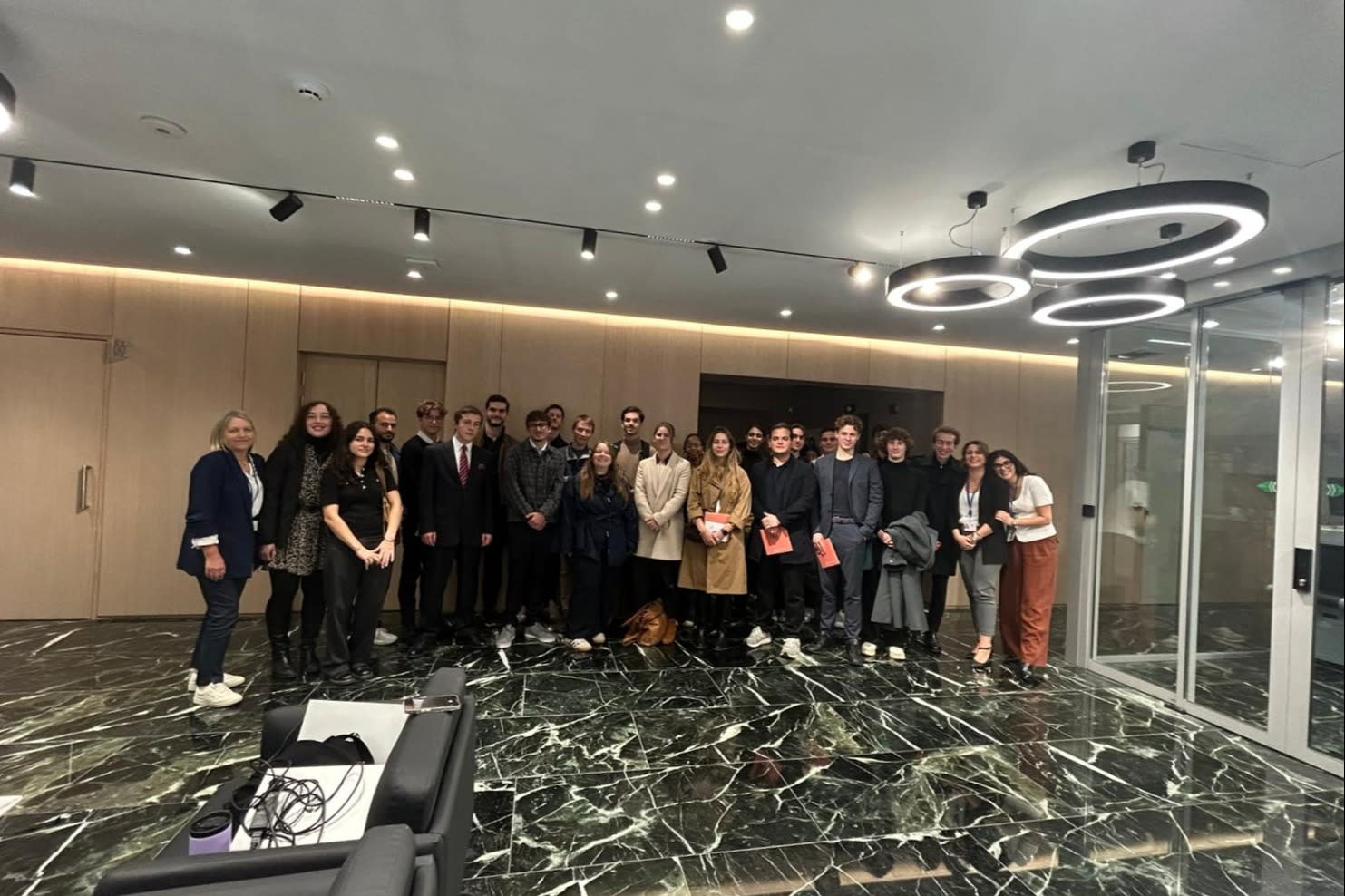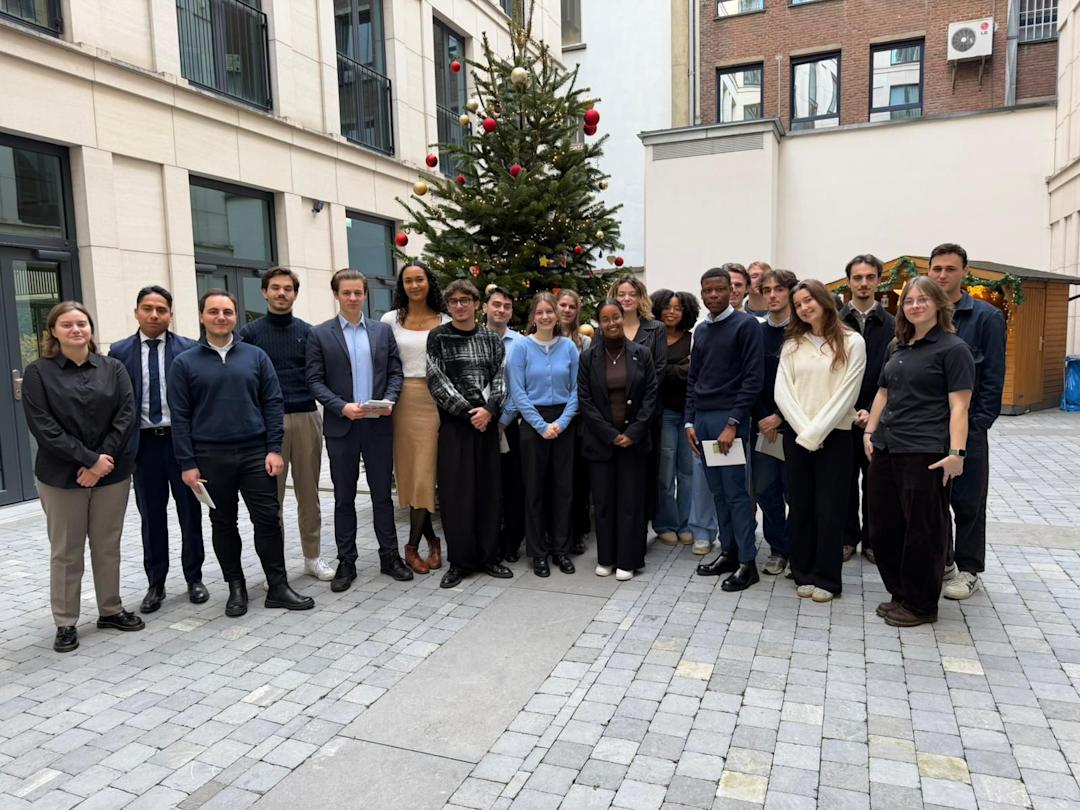Future Council Presidents – A visit to the Permanent Representation of Cyprus to the EU

Following last week’s visit to the Permanent Representation of Bulgaria to the European Union, the Comité Diplomatique had the honour to visit this week the Permanent Representation of Cyprus to the European Union on Wednesday, 15 October 2025. This was the second visit of our Three Permanent Representations to the European Union project, which comprises three meetings with the Permanent Representations of Bulgaria, Slovenia and Cyprus to discuss EU-related issues and compare national approaches.
We received a very warm reception in the newly renovated buildings of the Permanent Representation of Cyprus, as we had the chance to be the first group of people to be hosted in the new conference room! Welcomed by the staff and specialist attachés of the Representation, we were able to discuss topics related to Cyprus's upcoming Presidency of the Council in January 2026.
Firstly, Ms Berna Berberoglu, spokesperson for the Committee of the Permanent Representatives formation I (COREPER I), reminded us of the principle of the rotating presidency of the Council, for reasons of continuity and harmony between Member States, before discussing the trio that began in January 2025 with Poland, continued with Denmark and will end with Cyprus in January 2026. During its presidency, Cyprus will therefore work in continuity with Denmark (it will inherit its political agenda), but also with Ireland, which will assume the next presidency and the start of a new trio, for a smooth transition.
This term is of great importance to Cyprus, enabling it to set out its priorities within the trio’s framework: competitiveness; energy; budget; defence and security; and social issues, notably pharmaceuticals and housing. Although the latter remains a national competence, Cyprus will bring this issue to the negotiating table with the aim of achieving a coherent housing policy across the EU. Cybersecurity, enlargement policy and cohesion policy were also highlighted and were subsequently developed in greater depth by her colleagues.
As Mr Yiannos Demetriou and Mr Lenas Kakkouras, both Cybersecurity attachés to the Representation, explained in their presentation, ‘Cybersecurity’ refers to a practice that applies security to data in cyberspace. This complex and horizontal issue affects a large number of people, especially as it is becoming increasingly important in the current geopolitical context. Thus, during its Presidency of the Council, Cyprus will prioritise strengthening Europe's resilience in this area by adopting new legislative measures, while simplifying existing legislation (e.g. the CRA or the NIS2).
Subsequently, Ms Nektaria Katoutsi and Mr Stavros Vassiliou, the first and second secretaries of COELA (enlargement group) and COWEB (Western Balkans group), then recalled that the EU is, above all, a peace project (a guiding principle they intend to uphold during Cyprus’s Presidency); an especially relevant message in the context of the war in Ukraine. Enlargement would thus be a means of bringing together countries with shared values, putting an end to the discord between them.
There are indeed 10 candidate countries, which are at different stages of progress. Different situations were discussed: Montenegro, with which they share many characteristics and difficulties, particularly with regard to demographics and institutional resilience; the freeze on negotiations in Georgia due to the political situation in the country; as well as Albania, Turkey and Ukraine. In this regard, the speakers stressed that Ukraine remains a top priority for the EU and that Cyprus will give it special attention during its Presidency. However, while Ukraine enjoys very strong political support, it is not receiving preferential treatment and must meet the same conditions as everyone else in order to join the EU
Nonetheless, sensitive political challenges may arise during their term, such as convincing Member States sceptical of further enlargement, and managing the potential impact of ten new members on decision-making processes and EU institutions as a whole.
Finally, Xanthia Iacovides, Cohesion Policy attaché, explained that, as the EU oldest policy, the Cohesion Policy’s objective is to reduce economic, social and territorial disparities within the EU. It was strongly emphasised that these are real projects that change lives, as evidenced by the Thalia program (2021-2027), which provides a framework for a smart, green and fair transition in Cyprus.
Cohesion policy is the main pillar of the Multiannual Financial Framework 2028-2034 (MFF), the EU long term budget on which Ms Christina Kattami presented her work to us. The discussion touched on the need for a more flexible and crisis-responsive MFF, better adapted to future challenges. Consequently, Cyprus' role during its Presidency will therefore be to navigate and negotiate this budget: the most important thing for them is to be an ‘honest broker’ during their Presidency.
All these presentations and discussions enabled us to learn a great deal about the challenges facing Cyprus during its upcoming Presidency of the Council. We are consequently deeply grateful to all the speakers for their time, openness, and expertise.

